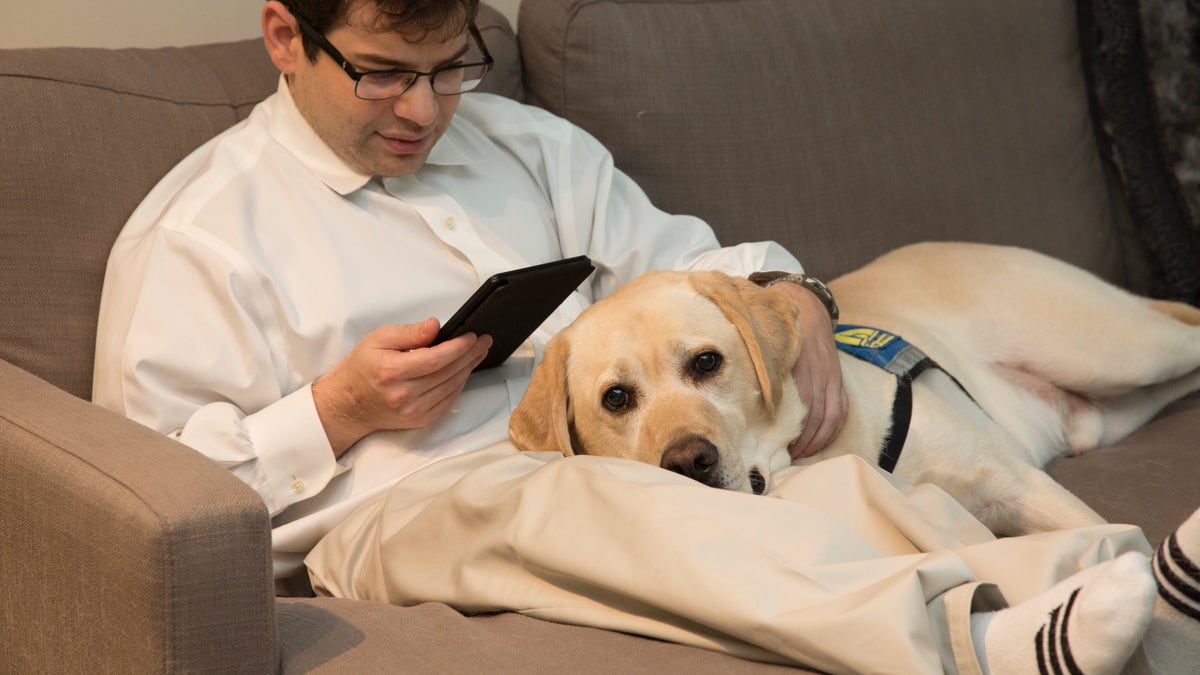
Service dogs are allowed anywhere people go in New York — even car services. (iStock)
It was a dark and stormy night. And pouring rain. Spike and I had to get from one point in the city to another where there was no good public transportation.
I pulled out my phone and ordered a car from a ride-sharing service — standing on the street corner, umbrella in one hand, leash and Spike in the other. I called the driver and told him exactly which corner I was on as it was such a mess of rain and people outside. He pulled right up to the corner and — upon seeing Spike — sped away and then canceled the ride.
SPIKE'S FAMILY REUNION AND NEW PUPPY BEGINNINGS
I was peeved — and soaking wet, and cold, and hangry. Spike wears a bright yellow vest with the Canine Companions for Independence logo indicating he is a service dog in training. In New York, state a service dog in training has the same rights as a fully trained service dog. He’s allowed to go everywhere I go, and is allowed on public transportation, buses, taxis, Ubers and Lyfts.
I ultimately called another car from the same service, who picked us up 15 minutes later and we eventually got home.
The whole thing was frustrating, and not the first time this has happened. I often plan additional time in my trips with Spike, knowing that drivers will (illegally) deny me service because of Spike. This is an inconvenience for me — and I don’t have a disability.
'MINI PIGS' BECOME GROWING PROBLEM FOR ANIMAL SHELTERS
My friend Ryan does, though. And he experiences this problem regularly with ride-hailing services and has decided to do something about it. He recently wrote about it, so I thought I’d share an excerpt from a piece he wrote on rootedinrights.org.
"I’d call for a ride, the driver would show, see us both, and inevitably the conversation would begin. 'I’m sorry, sir. I can’t take your dog.' I’d politely explain federal law, and most would insist they didn’t care and offer a litany of reasons why they’d be canceling my ride. I’d be left standing there, forced to repeat the process sometimes two or three times before successfully completing my trip. I’d sometimes build an extra 10-15 minutes of “rejection time” into my travel itinerary. I’d subsequently report these incidents and it quickly escalated into a game of he-said/ she-said. [The ride-hailing service] would apologize, throw a $10.00 credit my way for the inconvenience and move on. No follow up with me, or to my knowledge, the driver. It would be as if the incident never happened.
"But it kept happening. And it happened with such regularity that I began making the painful choice to leave [my dog] Pico at home. To anyone who relies on a service dog daily, this decision is difficult and never our first choice. To be without our service animals is to be without our medical equipment, which gives us our freedom, independence and our sense of self."

Ryan and Pico say they've experienced this same problem. (Canine Companions for Independence)
And this isn’t just a problem for Ryan. I’ve personally heard from dozens of service dog owners who have this problem. Ryan is one of the few who is documenting his experience with his cell phone and writing about it. This isn’t because he wants attention as has been suggested by people responding on social media. He wants transportation — and the same options that an able-bodied person. These rights are legally guaranteed under the Americans with Disabilities Act.
CLICK HERE TO GET THE FOX NEWS APP
Most of the public is fortunate enough that they don’t have to deal with this issue. You order your car and you're on your merry way. But the lack of education and enforcement by these ride-sharing companies is not just an inconvenience, it’s frustrating, humiliating and illegal. And it needs to stop.
For more information on Canine Companions for Independence, visit CCI.org.
